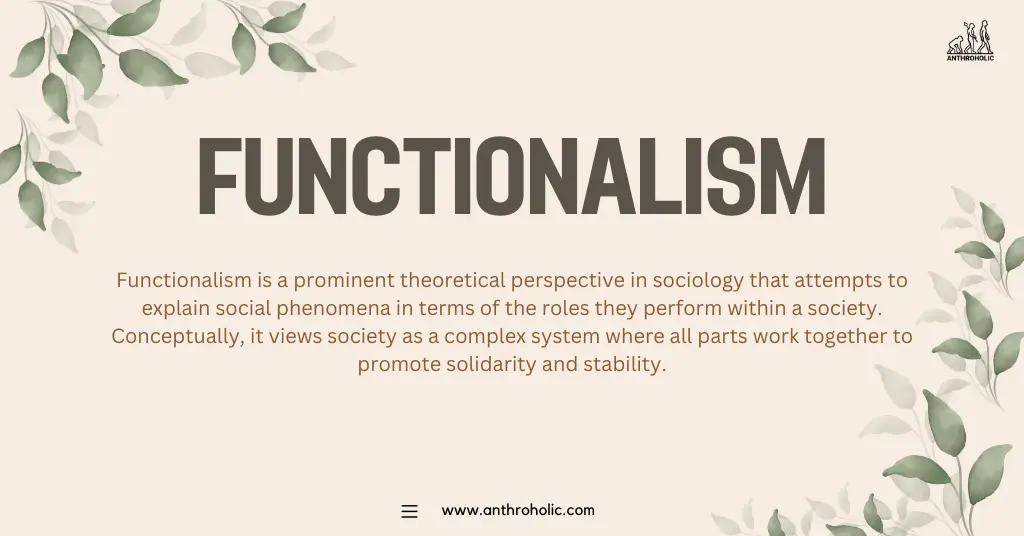AI Answer Evaluation Platform Live Now. Try Free Answer Evaluation Now
Functionalism
Functionalism is a prominent theoretical perspective in sociology that attempts to explain social phenomena in terms of the roles they perform within a society. Conceptually, it views society as a complex system where all parts work together to promote solidarity and stability.

Origins and Key Proponents
The roots of functionalism can be traced back to early sociological thinkers like Auguste Comte and Herbert Spencer, but it was primarily developed by Émile Durkheim [1]. Durkheim highlighted the integrative role of social institutions in maintaining social order, emphasizing the interdependence of society’s parts.
Subsequently, Talcott Parsons and Robert Merton further refined and extended functionalist theory. Parsons viewed society as a system striving towards equilibrium, while Merton introduced concepts such as manifest and latent functions [2].
Fundamental Principles of Functionalism
Functionalism rests on three central tenets:
- Society as a System: Societies are complex systems of interdependent parts that work together to maintain stability.
- Consensus and Social Order: Social order results from a consensus or shared norms and values amongst individuals.
- Functional Necessity: Each part of the society, whether an institution or role, fulfills a necessary function contributing to society’s overall stability.
The Functionalist Perspective of Society: Key Components
Functionalism visualizes society as comprising several interrelated parts, each serving a specific purpose:
- Social Structures: These include established societal arrangements such as family, education, religion, and economy. Functionalists posit that these structures exist to fulfill essential functions for societal maintenance and continuity [3].
- Social Functions: These refer to the roles that societal structures perform. Manifest functions are intentional and recognized, while latent functions are unintended and often unrecognized [4].
- Social Stability: For functionalists, the ultimate goal of a society is stability and order, which are achieved when social structures function effectively to fulfill their intended roles.
Strengths and Limitations of Functionalism
Like any theoretical framework, functionalism has its advantages and drawbacks:
Strengths
- Provides a broad, macro-level understanding of society.
- Emphasizes the interconnectedness of societal structures.
- Useful in understanding societal order and stability.
Limitations
- Tends to overlook social change and conflict.
- Overemphasizes societal harmony and consensus.
- Can be accused of justifying the status quo and social inequalities [5].
Critiques of Functionalism
Several sociological theories offer critiques of functionalism:
- Conflict Theory: This perspective argues that functionalism neglects societal inequalities and conflicts arising from power disparities.
- Symbolic Interactionism: This micro-level theory critiques functionalism’s macro-level, deterministic view of society, emphasizing instead individual agency and interaction [6].
- Feminist Theory: Feminists argue that functionalism supports patriarchal structures and fails to address gender inequality.
The Influence of Functionalism on Other Disciplines
Beyond sociology, the influence of functionalism extends to several other disciplines:
Anthropology: In anthropology, Bronisław Malinowski and A.R. Radcliffe-Brown applied functionalist principles to understand cultural and social practices in various societies [7].
Psychology: The functionalist school of thought also had a substantial impact on psychology, introducing the concept of “functionalism in the mind,” which states that our minds are shaped and structured based on the roles they need to perform [8].
Education: Functionalism has been instrumental in understanding educational structures, their role in societal maintenance, and socialization processes [9].
Functionalism and Modern Society: A Case Study
The COVID-19 pandemic serves as a case study for functionalism’s applicability in understanding modern societal dynamics. Various societal structures had to adapt rapidly and perform new or altered functions to maintain societal stability. For instance:
- Healthcare Systems: Emerged as a focal societal structure, testing its capacity and adaptability to an unprecedented crisis.
- Education Systems: Transitioned to digital platforms, illustrating the latent function of promoting digital literacy.
- Workplaces: Remote working became a norm, altering traditional workplace dynamics and functions.
This case demonstrates functionalism’s utility in understanding societal responses to crises and the consequent functional shifts in societal structures.
Conclusion
Functionalism offers a cohesive, stability-focused perspective of society, viewing societal structures and norms as essential components maintaining societal order. While it has faced critiques, particularly for its potential to justify societal inequalities, it remains a significant perspective in sociological thought, providing essential insights into societal functions and the interdependence of societal structures.
References
[1] Durkheim, É. (1893). The Division of Labour in Society. Paris: The Free Press.
[2] Parsons, T. (1937). The Structure of Social Action. New York: McGraw-Hill. Merton, R.K. (1957). Social Theory and Social Structure. New York: The Free Press.
[3] Haralambos, M., & Holborn, M. (2008). Sociology: Themes and Perspectives. London: Collins.
[4] Merton, R.K. (1968). Social Theory and Social Structure. New York: The Free Press.
[5] Johnson, A.G. (2011). The Blackwell Dictionary of Sociology. Oxford: Blackwell Publishing.
[6] Blumer, H. (1969). Symbolic Interactionism: Perspective and Method. Englewood Cliffs, NJ: Prentice-Hall.
[7] Malinowski, B. (1922). Argonauts of the Western Pacific. London: Routledge & Kegan Paul.
[8] James, W. (1890). The Principles of Psychology. New York: Holt.
[9] Durkheim, É. (1922). Education and Sociology. Paris: The Free Press.




